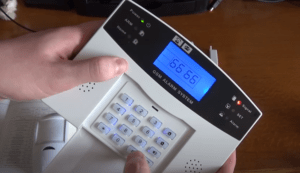Wireless house alarm systems are becoming increasingly popular as a way to keep intruders out of homes and businesses. Those who invest in them gain convenience, flexibility, and peace of mind.
However, as these systems become more popular, there is an increased risk that hackers will be able to gain access to the system’s data or remotely control it.
This article will look at the possibility of hacking wireless home alarm systems and what homeowners can do to ensure their security is not jeopardized.

Can Wireless House Alarms Be Hacked?
Regrettably, the answer is yes. Wireless home alarms can be hacked if they are not properly secured.
Hackers can gain access to the control panel or other system devices by exploiting programming flaws or employing brute-force methods such as password guessing.
This gives them access to the system’s data and allows them to remotely deactivate or activate it, rendering it useless.
Types of Wireless Home Alarms
Wireless home alarm systems are typically divided into two types.
Radio frequency: The most common are radio frequency systems, which use a wireless transceiver to send signals from the alarm system to a receiving station, which is usually located within 1,000 feet of the premises. These systems are typically simple to install and inexpensive.
Cellular-based: Cellular-based alarms, on the other hand, use cellular technology to communicate with a central monitoring station and are typically more expensive than RF systems. They provide more security because they do not rely on an external transceiver for communication.
How They Work?
Wireless home alarm systems use radio frequencies to securely transmit signals between different devices within the system. Motion detectors, door and window sensors, control panels, and keypads are examples of these devices.
When an intruder attempts to gain access to a home or business, the wireless devices detect their presence and send a signal to the control panel, which then activates the alarm.
Advantages and Disadvantages of Wireless Systems
One of the main advantages of having a wireless system is that it’s easier and less intrusive than installing wires around your home or business.
This makes it ideal for renters who don’t want to make permanent changes to their property, as well as for people who live in apartments with shared walls, where running wires may be difficult or impossible.
The disadvantage is that because these systems do not require any physical connection, there is no guarantee that they cannot be remotely hacked into by someone with malicious intent.
Types of Attacks And Vulnerabilities

Wireless house alarms can be hacked if someone with bad intentions knows how to gain access to the system, various types of attacks and vulnerabilities can be used.
Some common ones include gaining access to the radio frequencies it employs, discovering flaws in the security protocols, and remotely controlling the system using malware.
To protect against these types of threats, people should make sure their alarm systems are up to date and always use them safely.
Examples
A successful hack involving a wireless house alarm system occurred in 2017 when a family’s home in San Francisco was broken into.
The family had installed a cellular-based alarm system without realizing that their security protocols were inadequate and easily circumvented.
Hackers gained access to the system and disarmed it using a laptop and some additional hardware, leaving the family’s home vulnerable.
Risks of A Hacked Wireless House Alarm
When it comes to wireless house alarm systems, there are several risks that come along with having one.
These include the possibility of hackers gaining access to the system’s data or remotely controlling it.
Hackers can use a variety of techniques to gain access to the system’s radio frequencies, use malware to gain remote control of it, or find flaws in the security protocols.
Another risk is that hackers may be able to bypass the alarm’s sensors and disarm it without being detected. Intruders may gain access without setting off the alarm, leaving a home vulnerable.
Furthermore, if the alarm is deactivated, the monitoring center may not be notified and will therefore not respond to any intrusions.
How To Minimize Risks?
The first step is to Maintain security protocols by checking for updates and installing the most recent version on a regular basis. Ensure that all devices in the system are securely connected and that unauthorized access is prevented.
Another way is to use unique passwords for each device to prevent hacking. Educate all system users about the importance of not sharing passwords or sensitive information.
Finally, it’s a good idea to check wireless alarm logs regularly and verify all connected devices are functioning properly to identify any unusual activity.
Final Thoughts
In conclusion, wireless house alarms can be hacked just like any other device that is connected to the internet. However, with proper security measures in place and regular updates for your system’s firmware, you can significantly reduce the chances of being a victim of such an attack.
It is also important to remember that all systems have their weaknesses; it is up to us as users and owners to take appropriate steps in order to protect ourselves from malicious hackers who may try to gain access into our homes or businesses.
By following these tips and implementing smart security protocols, we can ensure our home remains safe while still enjoying the convenience of having a wireless alarm system.







